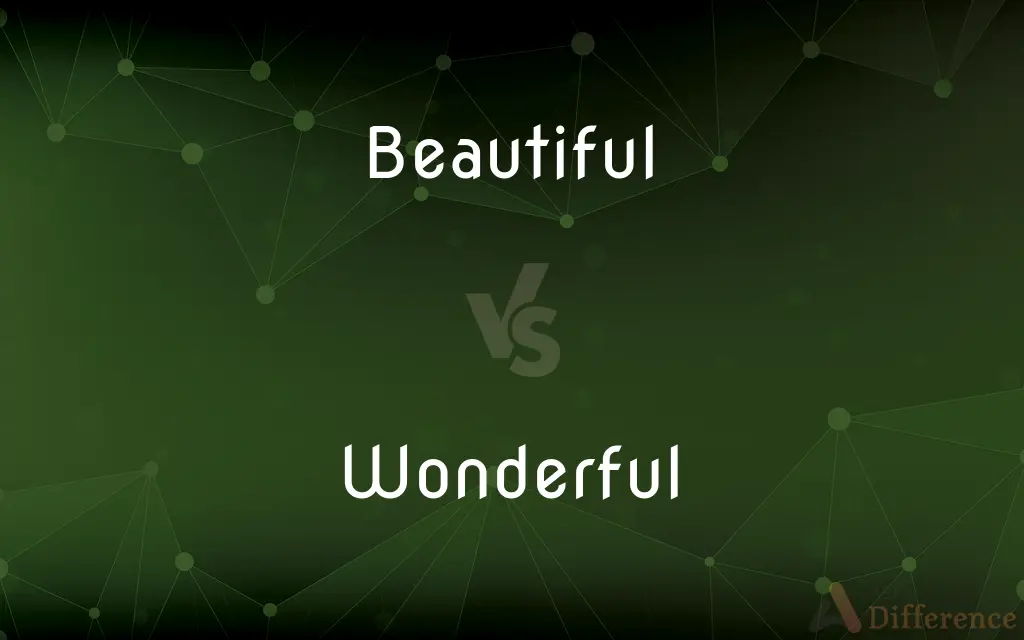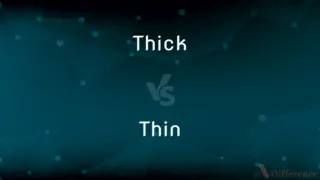Beautiful vs. Wonderful — What's the Difference?
By Tayyaba Rehman & Maham Liaqat — Updated on March 15, 2024
"Beautiful" primarily describes aesthetic appeal and physical attractiveness, while "wonderful" denotes a sense of awe, admiration, or pleasure, often related to qualities, actions, or experiences rather than appearance.

Difference Between Beautiful and Wonderful
Table of Contents
ADVERTISEMENT
Key Differences
Beautiful refers to something that is pleasing to the senses, especially to the sight. It is often used to describe people, natural scenes, artworks, and objects that possess aesthetic value and harmony in their appearance. The term encapsulates qualities like grace, elegance, and perfection of form, evoking a visual or sensual pleasure. Whereas, wonderful speaks to a deeper level of appreciation that may not necessarily be linked to physical attributes. It denotes something that is remarkable, inspiring a sense of wonder, joy, or admiration. Wonderful can describe experiences, achievements, qualities, and actions that deeply move or impress someone, regardless of their visual appeal.
The perception of beauty is largely subjective, influenced by cultural, social, and personal factors, and it is primarily associated with visual qualities. Beautiful things or people are admired for their visual harmony, proportions, and aesthetic appeal. On the other hand, the concept of something being wonderful transcends the visual domain, emphasizing emotional response and intellectual engagement. Something wonderful captivates the mind and heart, often through its impact, uniqueness, or the joy it brings, rather than just its appearance.
In literature and art, beauty often symbolizes purity, goodness, or an ideal state, appealing directly to the aesthetic senses. Meanwhile, the portrayal of something as wonderful may not rely on its beauty but on its ability to evoke awe, happiness, or a profound appreciation. This distinction highlights how beauty and wonder are appreciated through different lenses—one through the eyes, and the other through the emotional and cognitive response.
While the term "beautiful" can be applied to both the natural and human-made world, focusing on the form and composition, "wonderful" is more versatile, describing anything from personal experiences and feelings to achievements and natural phenomena. This versatility underlines the broader applicability of "wonderful," which can enrich the description of something by adding a layer of emotional depth or intellectual appreciation beyond mere appearance.
The distinction between beautiful and wonderful also underscores the difference in the types of pleasure or appreciation they invoke. The pleasure derived from beauty is often immediate and sensory, while the admiration for something wonderful may involve a more complex process of reflection, understanding, and emotional engagement, leading to a lasting impact on the individual.
ADVERTISEMENT
Comparison Chart
Primary Association
Aesthetic appeal, physical attractiveness
Sense of awe, admiration, pleasure
Domain of Application
Visual qualities, forms, harmony
Experiences, achievements, qualities
Subjectivity
Influenced by cultural, social factors
Beyond visual appeal, emotional engagement
Examples
Artworks, natural scenes, individuals
Actions, experiences, achievements
Emotional Response
Visual or sensual pleasure
Joy, admiration, intellectual engagement
Literature and Art
Symbolizes purity, goodness, ideal states
Evokes awe, happiness, profound appreciation
Versatility
Primarily visual
Applies to a broad range of contexts
Pleasure Type
Immediate and sensory
Reflective, understanding-based
Compare with Definitions
Beautiful
Having aesthetic appeal.
The beautiful landscape was a perfect subject for photography.
Wonderful
Denotes admiration and joy.
His wonderful achievement was celebrated by all.
Beautiful
Pleasing to the senses.
The painting was so beautiful that it took my breath away.
Wonderful
Inspiring a sense of wonder.
The concert was wonderful, leaving the audience in awe.
Beautiful
Symbol of purity and perfection.
The story described a beautiful, untouched wilderness.
Wonderful
Remarkable and pleasing.
Sharing stories around the campfire was a wonderful experience.
Beautiful
Focus on physical attractiveness.
The beautiful design of the building won many awards.
Wonderful
Beyond visual qualities.
The wonderful thing about friendships is their ability to enrich our lives.
Beautiful
Characterized by harmony and grace.
Her beautiful voice could soothe any soul.
Wonderful
Involves emotional and intellectual engagement.
Discovering new cultures during travels is a wonderful journey.
Beautiful
Having qualities that delight or appeal to the senses and often the mind.
Wonderful
Inspiring delight, pleasure, or admiration; extremely good; marvellous
The climate was wonderful all the year round
They all think she's wonderful
Beautiful
Excellent; wonderful
Hit a beautiful shot from the tee.
Wonderful
Admirable or very good; excellent or splendid
What a wonderful person she is.
Had a wonderful time at the party.
Beautiful
Used to express approval or delight.
Wonderful
Capable of eliciting wonder; astonishing
"The ... whale is one of the most wonderful animals in the world" (Charles Darwin).
Beautiful
Attractive and possessing beauty.
Anyone who has ever met her thought she was absolutely beautiful.
There's a beautiful lake by the town.
Wonderful
Tending to excite wonder; surprising, extraordinary.
Beautiful
Good, admirable.
He was a beautiful person; he would drop everything to help you.
You've done a beautiful thing today.
Wonderful
Surprisingly excellent; very good or admirable, extremely impressive.
They served a wonderful six-course meal.
What appears to be wonderful may turn out to be anything but.
Beautiful
(of the weather) Pleasant; clear.
It's beautiful outside, let's go for a walk.
Wonderful
(dialect) Exceedingly, to a great extent.
Beautiful
Well executed.
The skater performed a beautiful axel.
Wonderful
Adapted to excite wonder or admiration; surprising; strange; astonishing.
Beautiful
Someone who is beautiful. Can be used as a term of address.
The man was faithful to his wife, ignoring the many blonde beautifuls who surrounded him wherever he went.
Hey, beautiful!
Wonderful
Extraordinarily good; used especially as intensifiers;
A fantastic trip to the Orient
The film was fantastic!
A howling success
A marvelous collection of rare books
Had a rattling conversation about politics
A tremendous achievement
Beautiful
Having the qualities which constitute beauty; pleasing to the sight or the mind.
A circle is more beautiful than a square; a square is more beautiful than a parallelogram.
Beautiful
Delighting the senses or exciting intellectual or emotional admiration;
A beautiful child
Beautiful country
A beautiful painting
A beautiful theory
A beautiful party
Beautiful
Aesthetically pleasing
Beautiful
(of weather) highly enjoyable;
What a beautiful day
Common Curiosities
Can the term "wonderful" apply to negative experiences?
Typically, "wonderful" denotes positive admiration and joy, but in some contexts, it could be used ironically or in a nuanced way to describe overwhelming or awe-inspiring experiences, regardless of their positivity.
Does technology or innovation ever get described as beautiful or wonderful?
Technology and innovations can be described as both, depending on their aesthetic design (beautiful) and their impact or the marvel they inspire (wonderful).
Can landscapes or nature be wonderful?
Yes, natural landscapes can be described as wonderful when they evoke awe, joy, or a profound sense of admiration, beyond their visual beauty.
How do personal experiences influence the perception of beauty and wonder?
Personal experiences shape individual tastes and sensibilities, affecting what one finds beautiful or wonderful based on past interactions, emotional connections, and intellectual engagements.
Can something be both beautiful and wonderful?
Yes, something can be both visually appealing and evoke a deep sense of wonder or admiration, embodying both qualities.
Is the perception of beauty more subjective than that of wonder?
While both are subjective, beauty is often more influenced by cultural and personal aesthetics, whereas wonder can be more universally felt due to its emotional and intellectual aspects.
How do beauty and wonder affect human well-being?
Experiencing beauty and wonder can significantly enhance well-being by providing sensory pleasure, emotional enrichment, and intellectual stimulation, contributing to a fuller, more meaningful life experience.
How do cultural differences affect the perception of beauty and wonder?
Cultural backgrounds can significantly influence what is considered beautiful due to differing aesthetic standards, while the sense of wonder might be more universally recognizable through shared human emotions and values.
How are beauty and wonder represented in art and literature?
In art and literature, beauty often symbolizes ideals and purity, while wonder may represent discovery, transformation, and the transcendence of ordinary experiences.
Why is it important to distinguish between beautiful and wonderful in communication?
Distinguishing between the two helps convey more precise emotions and responses, enriching language and communication by aligning the description with the specific qualities or impacts being referenced.
Share Your Discovery

Previous Comparison
Thick vs. Thin
Next Comparison
Impact vs. RoleAuthor Spotlight
Written by
Tayyaba RehmanTayyaba Rehman is a distinguished writer, currently serving as a primary contributor to askdifference.com. As a researcher in semantics and etymology, Tayyaba's passion for the complexity of languages and their distinctions has found a perfect home on the platform. Tayyaba delves into the intricacies of language, distinguishing between commonly confused words and phrases, thereby providing clarity for readers worldwide.
Co-written by
Maham Liaqat











































